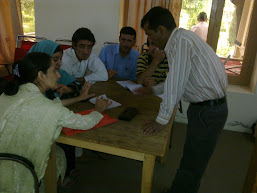The process
of action research starts with a general idea of improving the situation and
ends at an interactive independent professional practice by research
participants. During the research process, significant insights are obtained to
plan learning activities on the basis of reflection on findings in the
situation. Action research provides enough
flexibility to allow unclear beginnings while progressing towards the precise
ending. The cyclical process also provides an opportunity to learn from the
experiences which are gained from the reflection on the process and its
outcomes. Queries related to the teaching and learning process are focused on during
the action research. Burns (2000) was of the opinion that during the process of
action research, questions are raised due to the observation in a specific social
setting.
The
unique feature of action research is the researcher’s direct participation in
the research by planning, implementing, observing, and reflecting on the process
(Burns, 2000; Gay & Airasian, 2003). The researcher is an integral part of
the change process during the action research playing multiple roles of
planner, executor, observer, and reflective practitioner throughout the process
of action research. Resultantly, a change is brought about in the situation and
an understanding of the complex nature of change as a process is developed.
The
entire process of action research revolves around the critical reflections of
the practitioners regarding their practices and these reflections contribute
towards the development of the situation (Gay & Airasian, 2003). During the
action research process, reflective practice is carried out regarding the
process and product through reviewing the academic stuff developed by the
research participants followed by feedback and the learning while improving the
reviewed academic stuff is applied by the participants which improve the
situation.
Action
research as a process takes time to introduce a change through planning,
implementing, observing, and reflecting. The participants need to know this
characteristic of action research and make a commitment to take part in the
research project throughout the process (Gay & Airasian, 2003). When the process
of action research starts, the researcher needs to inform the research participants
about the action research process and they participate in the process
throughout the research study willingly and voluntarily.
Burns, R. B. (2000). Introduction to research methods (4th
ed.). Melbourne: Longman.
Gay, L. R., & Airasian, P.
(2003). Educational research:
Competencies for analysis
and applications ( 7th
ed.). New Jersey: Merrill Prentice Hall.

